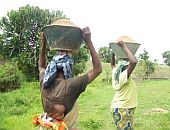 | « Back to article | Print this article |
 Women farmers, particularly in poor countries will be worst hit by climate change as they make up the larger share of the agricultural work force and also because they have fewer access to income-earning opportunities, a new UN report has said.
Women farmers, particularly in poor countries will be worst hit by climate change as they make up the larger share of the agricultural work force and also because they have fewer access to income-earning opportunities, a new UN report has said.
The report, Facing a changing world: Women, Population and Climate, released in the United Nations, stressed that the majority of the 1.5 billion people living on one dollar a day or less are women, and they have so far been overlooked in the Climate Change debate.
"With the possibility of a climate catastrophe on the horizon, we cannot afford to relegate the world's 3.4 billion women and girls to the role of victim," United Nations Population Fund chief Thoraya Ahmed Obaid said. "Wouldn't it make more sense to have 3.4 billion agents for change?"
Women particularly those in poor countries will be affected differently than men, according to the study by the UNFPA that launched its report in more than 130 cities around the world.
"They are among the most vulnerable to climate change, partly because in many countries they make up the larger share of the agricultural work force and partly because they tend to have access to fewer income-earning opportunities," it noted.
The UNFPA study said that the poorest populations while having contributed the least to climate change are the most vulnerable to the crisis. "Our impending climate disaster is perhaps the most inequitable threats of our time," Richard Kollodge of the UNFPA, told media persons.
"Right now the carbon footprint of the poorest billion people on earth is a mere three percent of the world's total carbon footprint yet is the poorest billion who will bear the overwhelming brunt of our changing climate," he added.
The organisation further highlighted that within poor populations, farmers will see their crops being battered by changing weather patterns, and droughts and floods are already affecting female farmers.
"Drought and erratic rainfall force women to work harder to secure food, water and energy for their homes," the report noted. "Girls drop out of school to help their mothers with these tasks. This cycle of deprivation, poverty and inequality undermines the social capital needed to deal effectively with climate change."
The study finds that old people tend to consume less, and women are more likely to be sustainable consumers, which means that women's involvement in climate change solutions is central to reducing emissions.
The UNFPA report stressed that the impacts of climate change vary across the board, and called on countries not just to depend on "technology" but to have a "people centred approach" to tackle climate change.
"Vulnerability varies between men and women, between young the middle-aged and the elderly, and between those living in rural and urban areas," Daniel Schensul, climate-change expert with the UNFPA said.
"How many people we are, where we live, and how we live are crucial for understanding climate change and for finding effective ways to manage its negative impacts."
It urged governments to invest in women and girls that empower them to cope with the future impacts of climate change, and adapt to the changes that have already occurred through education, health, economic development, and reduce poverty.
"Girls with more education tend to have smaller and healthier families as adults," Kollodge explained.
"Women with access to reproductive health services including voluntary family planning have lower fertility rates that may contribute to slower growth in greenhouse gas emissions in the long run," he added.
The report called on governments to recognise the gender inequities while formulating policies to combat climate change, and stressed that special attention may be required to compensate for inequalities that women currently face.
"Policies that aim to address any aspect of climate change will be less effective if they fail to take into account the differences between men, women, boys and girls," it noted.
"Gender-blind policies may exacerbate the problems associated with climate change by widening inequalities between the sexes."